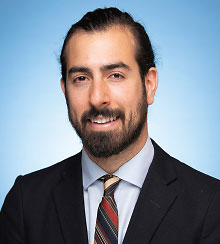Briefing Emphasizes Transformative Power of Crisis Services on Mental Health Care
Abstract
Matthew Goldman, M.D., M.S., told members of Congress that crisis services have a wealth of research behind them, showing that they provide high-quality care in less-expensive and less-restrictive environments.
For the past five years, Matthew Goldman, M.D., M.S., has worked with mobile crisis teams, seeing firsthand the benefits of treating patients in their homes. “They say a picture’s worth a thousand words, but a field visit to somebody’s home is worth a million,” he said. “The patients are in their own safe, comfortable environments, and they might have the support systems they need right there in the room with us. It’s such a different experience compared with being in a whitewashed, fluorescent emergency department, waiting for hours to be seen.”

“The research highlights that crisis services are very well positioned to advance better quality care, equity, lower costs, person-centered care, and less-restrictive environments,” says Matthew Goldman, M.D., M.S.
Goldman is a member of APA’s Council on Advocacy and Government Relations and the medical director of the San Francisco Department of Public Health’s Comprehensive Crisis Services. He spoke during a congressional briefing titled “Mental Health Is Not a Crime: How 988 and Crisis Services Will Transform Care.”
The briefing was one of a series hosted by the Mental Health & Suicide Prevention National Response to COVID-19, an initiative of the National Action Alliance for Suicide Prevention, of which APA is a partner. The initiative is working to create comprehensive solutions to the pandemic’s impact on psychiatric health, according to the website.
In addition to Goldman, the speakers included Murphy Paul Jr., the chief of police of the Baton Rouge Police Department; Richard McKeon, Ph.D., chief of the Suicide Prevention Branch at the Substance Abuse and Mental Health Services Administration (SAMHSA); Tonja Myles, a peer support specialist with Set Free Indeed ministries; and Ron Bruno, executive director of CIT International.
During his talk, Goldman described the data that illustrate the need for mental health crisis care services. Only 50% of adults with suicidal ideation, plans, or attempts report any contact with any mental health service in the previous year, he said. He also detailed the disparities that are revealed in the data. In Maryland, for example, suicides during the COVID-19 pandemic declined by half in the White population but doubled among the Black population.
He also outlined research backing up the efficacy of many of those services. Services such as crisis call centers, mobile crisis teams, crisis facilities (like acute residential or peer-staffed crisis respite units), and post-crisis wraparound have been proven in numerous studies to provide a host of benefits, including decreased suicidality, emergency department (ED) costs, and hospitalization.
He summarized current research including a study he and his colleagues are conducting in Arizona, which he cited as a national leader in crisis services. Using Medicaid claims data, he and his colleagues looked at a one-year sample from 2017-2018 to determine if a mobile crisis, crisis facility, ED, or inpatient service was followed by a higher intensity service within 72 hours. They found that among 126,000 cases of people experiencing a mental health crisis, 41% remained in crisis-only settings (mobile crisis or crisis facility) without needing higher level care. Further, about half of crisis episodes in which a mobile crisis team was involved were not followed by the use of acute mental health services within 72 hours, likely meaning the crisis was resolved in the field.
The findings highlight that a system that has a lot of crisis components built out can effectively maintain patients in settings that are lower cost, involve shorter stays, and are less restrictive, he said.
Communities in America are experiencing trauma, Paul explained. Incidents such as the murder of George Floyd and the COVID-19 pandemic have exacerbated existing suffering and distress in communities across the country. “We know, as law enforcement leaders, we cannot arrest our way out of this problem, and we cannot do it alone,” Paul said. “The mental health crisis we’re facing is real in America—it’s very real. And this requires us to rethink how we approach calls for services involving people experiencing a mental health crisis.”
The participants also spoke about the implementation of the new mental health crisis phone number, 988. It will be available nationally by July 2022 and represents an opportunity to build a strong, comprehensive system for mental health crisis care, particularly when combined with other services such as mobile crisis units and crisis facilities.
“For the past half century, 911 has become a system that people rely on all across the country,” McKeon said, and 988 may eventually be viewed in exactly the same way. ■
The briefing can be viewed here.



